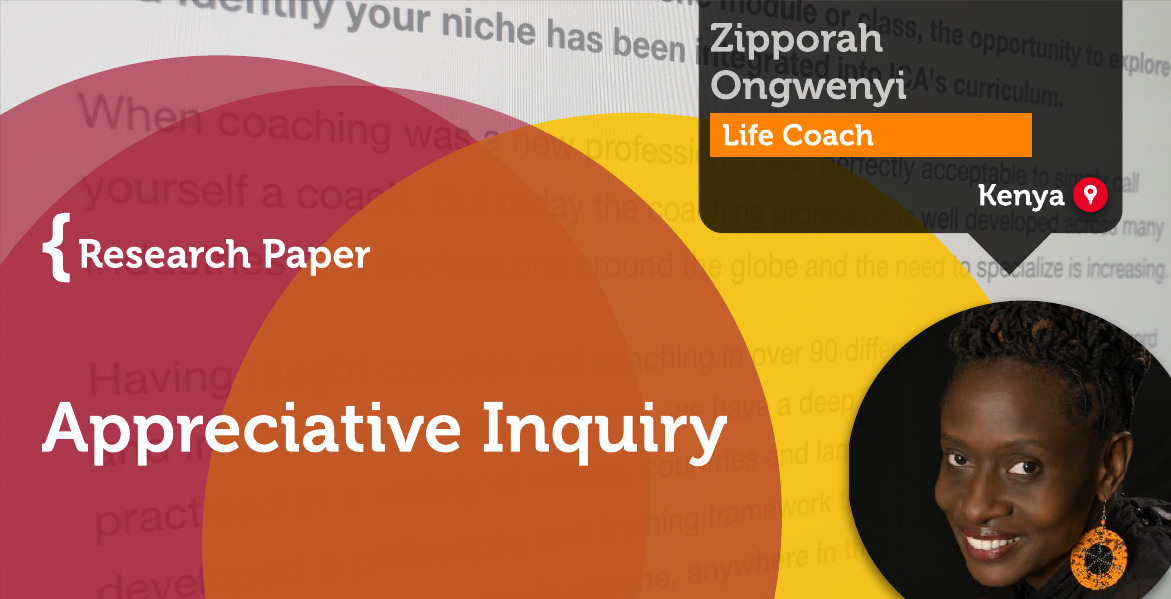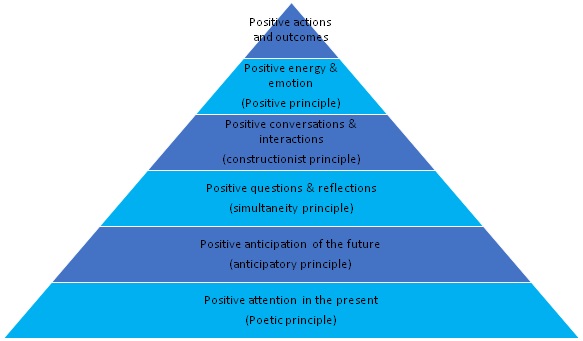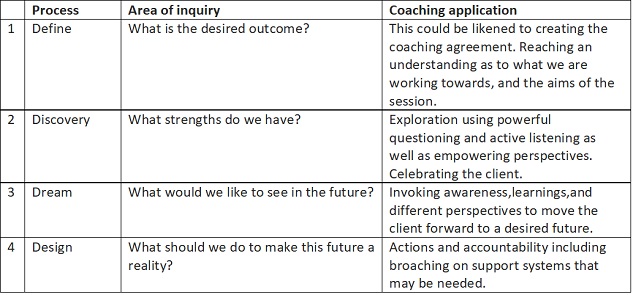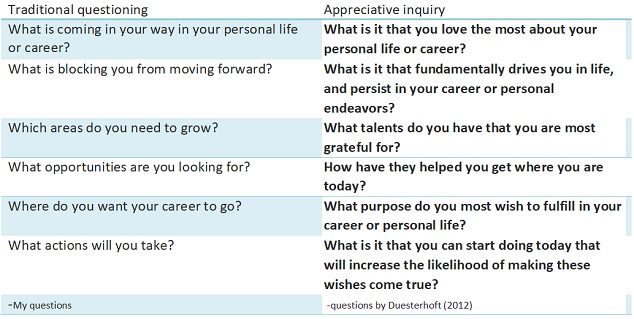A Research Paper By Zipporah Ongwenyi, Life Coach, KENYA

Can Appreciative Inquiry Help Coaches Ask the Right Questions and Have a More Fulfilling Coaching Experience?
 It is attributed to Voltaire to have said ‘judge a man by his questions rather than his answers. A great quote indeed, given that in everyday life we are always asking questions, and many are the times we get frustrated by the kind of answers we receive. It is almost second nature for people to ask questions from a place of doubt, especially when seeking to solve a problem. Most times it ends in frustration because the respondent puts up his/her guard.
It is attributed to Voltaire to have said ‘judge a man by his questions rather than his answers. A great quote indeed, given that in everyday life we are always asking questions, and many are the times we get frustrated by the kind of answers we receive. It is almost second nature for people to ask questions from a place of doubt, especially when seeking to solve a problem. Most times it ends in frustration because the respondent puts up his/her guard.
In the field of coaching, we must ask the right questions that not only put the client in a proper frame of mind but also elicit well-founded answers to move the client forward. This is where appreciative inquiry comes in. Can the use of appreciative inquiry in coaching enable the right questions that lead to a fulfilling coaching experience?
Appreciative Inquiry
Appreciative inquiry (AI) is a process of search and discovery designed to find the best in people, their organizations, and the world around them. As an organization development intervention, it is a collaborative, participative approach that involves asking questions to strengthen a system’s capacity to heighten positive potential, generating new ideas and actions. In the AI process, questioning moves from determining what is valued and appreciated to combining strengths and activating people’s creative energy to ignite change (cooperrider&Serkerka, 2003).
The four steps of the Appreciative Inquiry model are:
- Discovery- The best of what is.
- Dream- What could be?
- Design- What should be?
- Delivery-What will we do?
In coaching, AI focuses on what’s working, rather than what’s not working, and leads to people co-designing their future. It deviates from a traditional approach that focuses on problems and leads to their amplification thus eroding the energy, and motivation of those involved.
Five of the core principles of appreciative inquiry that have been put forward are:
- The constructionist principle: Words create worlds
Through our conversations and interactions with other people, we don’t just interpret and understand the world of experience; we also create the reality in which we live.
- The simultaneity principle: Inquiry creates change
Conversations and interactions become positive the instant we ask a positive question, tell a positive story, or share a positive reflection.
- The poetic principle: We can choose what we study
The more we attend to the positive dimensions of the present moment, the more positive will be our intentions for future moments. When we focus on problems, we get more problems. When we focus on possibilities, we get more possibilities.
- The anticipatory principle: Image inspires action
When we anticipate a positive future, everything tilts in that direction. Positive anticipation of the future is a proleptic force that energizes the present.
- The positive principle: Positive questions lead to positive change
Positive energy and emotion broaden thinking, expand awareness, increase abilities, build resilience, offset negatives, generate new possibilities, and create an upward spiral of growth.
Other principles also include:
- The wholeness principle: Wholeness brings out the best
- The enactment principle: Acting “as if” is self-fulfilling
- The free choice principle: Free choice liberates power
The pyramid below illustrates how the principles are related to each other and how they work together for positive actions and outcomes.

The Whole Cycle of the Appreciative Inquiry Process
Given that our knee-jerk inclination is to employ an approach of finding out what is not working, the use of AI necessitates some ground preparation for the client by first explaining the method and its aims, taking care to explain that the aims of the coaching exercise will be upheld with the AI method.
Critics of AI, as well as those who have not properly understood the methodology, have touted that it avoids the hard truths and chooses to skirt around issues on the soft ground leading to an unbalanced understanding of issues. As well, it has been purported that it minimizes issues and therefore leaves behind festering wounds, that seem well-healed only on the surface.
It is, therefore, imperative that one goes through the whole cycle of the AI process if one is to achieve its intended purpose.

Appreciative Inquiry Coaching Example
A client, Carol, comes into coaching expressing dissatisfaction with both her career and personal life. She feels stuck and is seeking help to move forward. Using AI, the coach would make use of the following line of inquiry. Notice the difference between the AI questions vs the traditional questions. The traditional questions may still get you the answers and lead Carol to move forward, but the AI questions achieve much more than that. They affirm Carol in the process, are from a place of love, and naturally give her confidence and put her back in the driver’s seat of her life. She realizes that she is resourceful and that she has had it all along. She moves forward with wholeness.

For Both the Coach and the Client, Appreciative Inquiry Necessitates a Mental Shift
Appreciative inquiry requires a shift of mindset for both the coach and the client. In a world where we are accustomed to talking endlessly about our problems, it offers a refreshing starting point where we immediately shift our perspectives even by just focusing on one of the principles-the positive principle: positive questions lead to positive change.
The reverse poem by Chanie Gorkin best illustrates perspectives and best illustrates what you can get based on your starting point.
Today was the absolute worst day ever
And don’t try to convince me that
There’s something good in everyday
Because, when you take a closer look,
This world is a pretty evil place.
Even if
Some goodness does shine through once in a while
Satisfaction and happiness don’t last.
And it’s not true that
It’s all in the mind and heart
Because
True happiness can be attained
Only if one’s surroundings are good
It’s not true that good exists
I’m sure you can agree that
The reality
Creates
My attitude
It’s all beyond my control
And you’ll never in a million years hear me say
Today was a very good day
Now read the poem from bottom to top.
References
Cooperrider, D. L., & Serkerka, L. E. Toward a theory of positive organizational change.
In K. S. Cameron, J. E. Dutton, & R. E. Quinn (Eds.), Positive organizational scholarship:
Foundations of a new discipline San Francisco, CA: Berrett-Koehler.
Core principles of appreciative inquiry summarized by D. Whitney & A. Trosten-Bloom
David J.MacCoy. Appreciative inquiry and Evaluation-Getting to What Works. Canadian journal of program evaluation (fall/automne)
https://www.forbes.com/quotes/9496/
https://positivepsychology.com/appreciative-inquiry/
https://positivepsychology.com/appreciative-inquiry-process/
https://www.wellcoach.com/newsletters/images/Chapter-4.pdf
https://whatworks.org.nz/appreciative-inquiry/
https://newyork.cbslocal.com/2015/07/27/worst-day-ever-poem-goes-viral/